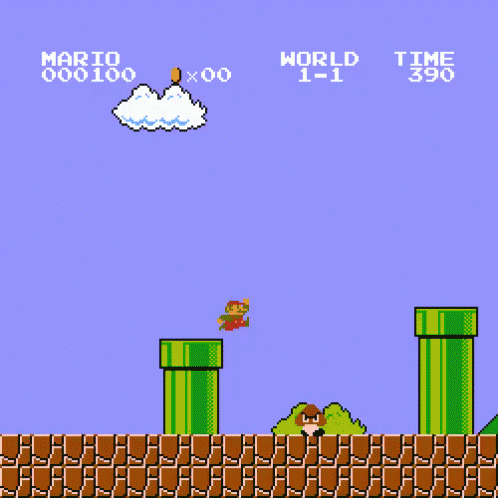What are some things we take for granted as long-time gamers when picking up a new title? We can run, jump, and dash. Enemies have health bars (usually red). We have an inventory, mini map, and other features that help us accomplish our goal. But what does picking up a new title look like for someone who has never touched a controller in their life?
One day, while one of my endless promenades through the YouTube recommendation system, I stumbled across a video by popular creator Razbuten called "What Games Are Like for Someone Who Doesn't Play Games." In said video, Razbuten makes his wife play a collection of titles ranging from Super Mario Bros to Dark Souls. Razbuten documents her struggles and successes as a person who has only ever played Mario Kart, and the results were both highly interesting and notably entertaining.
(Side note: I'll be referring to the subject as Razbuten's wife, as she's never referred to by name in the video.)
In almost all of the games Razbuten's wife played, there were multiple functions she simply didn't know existed. We take these for granted as long-time gamers. For example, Razbuten's wife was frustrated that she didn't know she could dash in Super Mario Bros, which made her time on each level way higher than they had to be. To her credit, the game doesn't explicitly say you can dash. But someone who plays a lot of games knows dashing is a feature most titles have, so they would fiddle with the controls until they figured out how to do it.
Razbuten's wife struggled with manipulating a controller in general. Every time a game told her to press a specific button, she had to look down at the controller to figure out which one it was. Her greatest challenge in this realm came while playing The Last of Us. There's a point where the game prompts the player to press L3, which isn't explicitly labeled on the controller. You can see why this caused problems. The prompt was a circle, so Razbuten's wife assumed she had to do something with the joystick, but how was she supposed to know you could even press down on it? She ended up just walking back and forth around the area until eventually figuring it out. A long-time gamer wouldn't even think twice about this prompt.
Controls ended up being the least of her struggles. Razbuten's wife had a hard time understanding video game "logic," namely where to go and what lessons she was supposed to learn. For example, there's a part in Uncharted 2 where the player scales a hanging train. Her idea was to swing from a pipe through a window. However, the game obviously doesn't let you do this, and she was disappointed when the only path she could take involved little more than just pressing left. While her idea would work in theory, Razbuten raised the point that developers are restricted. There's no physical way to code every possible action in, otherwise games would never get released. Long-time gamers are used to this concept. If a path looks blocked off, I wouldn't waste time trying to get through, but a new player who has no concept of what is allowed and restricted in games might explore it anyway.
All of these combined struggles make new players like Razbuten's wife more likely to quit playing due to frustration. Razbuten mentioned that there were multiple instances where she expressed a desire to stop playing, but he made her keep going for the video's sake. These high entry barriers contribute to the self-perpetuating "aristocracy" of the game community, where players who have been playing for longer and have an abundance of time and money to spend on games are more likely to be better. Christopher Paul raises the point in "The Toxic Meritocracy of Video Games: Why Gaming Culture is the Worst" that skill transfers ensure that players who have been playing for longer are rewarded for it. Examples of skill transfers include health bars, mini maps, and other UI features that new players need more time to understand.
Once these entry barriers are established, it's very hard for new people to break into the game community. Razbuten brought up the idea that knowledge about video games mainly spreads from person to person. This perpetuates a toxic meritocracy if the community is homogenous or certain people can't get access to it (ie. through forums, game shops, etc.) So if, for example, a game's community starts as a group of white males with access to the internet, they're more likely to spread knowledge and their experiences with other white males who have access to the internet.
All that being said, I'm grateful I stumbled upon Razbuten's video because it stuck with me. He ended up making it into a series where he observed his wife playing certain titles in greater detail, and they were all as interesting at the first. As someone with a high degree of video game literacy, it was intriguing to peek into a new player's mind. I hope her experiences can help me combat gatekeeping and integrate new players into the gaming community.
[1] Paul, Christopher A. The Toxic Meritocracy of Video Games : Why Gaming Culture Is the Worst, University of Minnesota Press, 2018. ProQuest Ebook Central, http://ebookcentral.proquest.com/lib/wisc/detail.action?docID=5330038.Created from wisc on 2021-09-01 19:40:34.
[2] Razbuten. (2019, September 28). What Games Are Like For Someone Who Doesn’t Play Games [Video]. YouTube. https://www.youtube.com/watch?v=ax7f3JZJHSw



Very insightful comments- much to consider, for both gamers and non gamers alike.
ReplyDelete